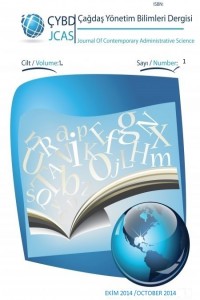Abstract
İş yaşamının yoğun ve stresli koşulları,
çalışanların tükenmişlik hissi yaşamasına yol açabilmektedir. Çalışanların
tükenmişlik yaşaması bireyin kendisi ve ailesi için yıkıcı sonuçlara yol
açarken, iş ortamı ve iş verimliliği bakımından da olumsuz sonuçlar
doğurabilmektedir. Bu çalışmada tükenmişlik olgusunun nedenleri, sonuçları ve
tükenmişlik konusunda yapılan çalışmalar bağlamında irdelenmiştir.
References
- Cherniss, C. (1980a). Professional Burnout in human service organizations. New York: Praeger.
- Cherniss, C. (1980b). Staff burnout: Job stress in human services. Beverly Hills, CA: Sage Publications.
- Cherniss, C., ve Dantzig, S.A. (1986). Preventing and managing job-related stress. In R. R. Kilburg, P. E. Nathan, ve R. W. Thoresan (Eds.), Professionals in distress: Issues, syndromes, and solutions in psychology (pp. 255-273). Washington, DC: American Psychological Association.
Abstract
References
- Cherniss, C. (1980a). Professional Burnout in human service organizations. New York: Praeger.
- Cherniss, C. (1980b). Staff burnout: Job stress in human services. Beverly Hills, CA: Sage Publications.
- Cherniss, C., ve Dantzig, S.A. (1986). Preventing and managing job-related stress. In R. R. Kilburg, P. E. Nathan, ve R. W. Thoresan (Eds.), Professionals in distress: Issues, syndromes, and solutions in psychology (pp. 255-273). Washington, DC: American Psychological Association.
Details
| Primary Language | Turkish |
|---|---|
| Journal Section | Research Article |
| Authors | |
| Publication Date | October 15, 2014 |
| Submission Date | August 15, 2014 |
| Acceptance Date | October 1, 2014 |
| Published in Issue | Year 2014 Volume: 1 Issue: 1 |
In order for the applied article to be evaluated, it must be written according to the journal's writing rules, the full text must not contain the author's information, it must be written according to the article template, the similarity report must be uploaded, and the copyright transfer form must be signed and uploaded. The articles accepted for publication after the evaluation process has been completed should be corrected by the author(s) and uploaded to the journal website again by adding author information. Information about the researches that require the permission of the Ethics Committee can be accessed from the Ethical Principles and Publication Policy page. For studies that do not require Ethics Committee Permission, the Study Declaration Form that does not Require Ethics Committee Permission should be filled out and uploaded to the system and stated in the article.


